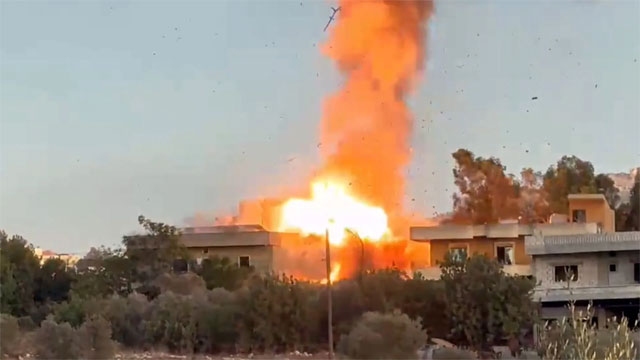Daijiworld Media Network - Beirut
Beirut, Sep 21: Tensions along the Lebanon-Israel border have escalated again following the death of a Hezbollah member in an Israeli airstrike on a civilian vehicle in southern Lebanon, Lebanese officials confirmed on Saturday.
The targeted strike occurred on the Khardali-Marjayoun road, in Lebanon’s eastern southern border region. The victim was identified as Hassan Shahrour, a resident of Kafr Kila and known Hezbollah activist, according to Lebanese army intelligence sources cited by Xinhua News Agency. The strike was reportedly carried out by an Israeli drone, sparking renewed concerns about the fragility of the current ceasefire.
A U.S. and French-brokered ceasefire, implemented on November 27, 2024, was meant to end the border clashes between Israel and Hezbollah that flared up following the Gaza conflict. However, sporadic Israeli strikes have continued under the justification of countering Hezbollah threats along the frontier.

The latest airstrike is part of a broader pattern. On September 18, the Israeli military launched multiple strikes on southern Lebanese villages including Mays el Jabal, Dibbine, Kfar Tebnit, and others, targeting alleged Hezbollah infrastructure. Those strikes killed two Hezbollah members—Hussein Hassan Ramadan and Ammar Hayel Qsaybani—and wounded 11 others, further fuelling instability in the region.
Israel maintains a military presence at five key positions near the Lebanese border and has defended its ongoing operations as necessary pre-emptive actions. Lebanese officials, however, view these as clear violations of UN Security Council Resolution 1701, which ended the 2006 war between Israel and Hezbollah and called for respect of the Blue Line and disarmament of non-state actors in southern Lebanon.
Lebanese Prime Minister Nawaf Salam condemned the latest airstrikes, accusing Israel of undermining the ceasefire agreement and international law. He urged the international community, especially the U.S. and France, to hold Israel accountable and pressure it to cease hostilities, withdraw from occupied Lebanese territories, and release detained Lebanese citizens.
The repeated violations of the ceasefire and increasing frequency of strikes suggest that the region remains on a knife's edge, with even a minor miscalculation potentially reigniting full-scale conflict.